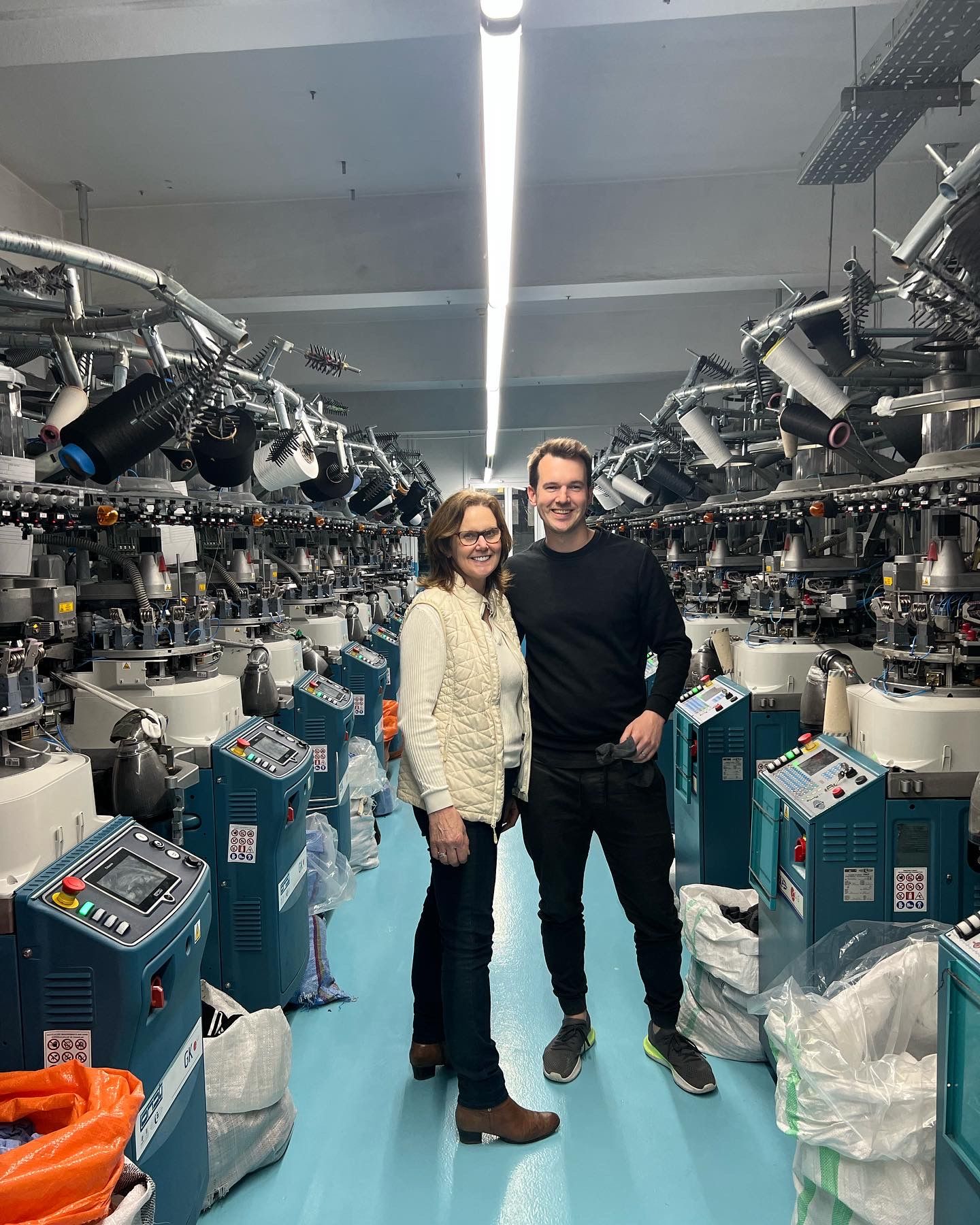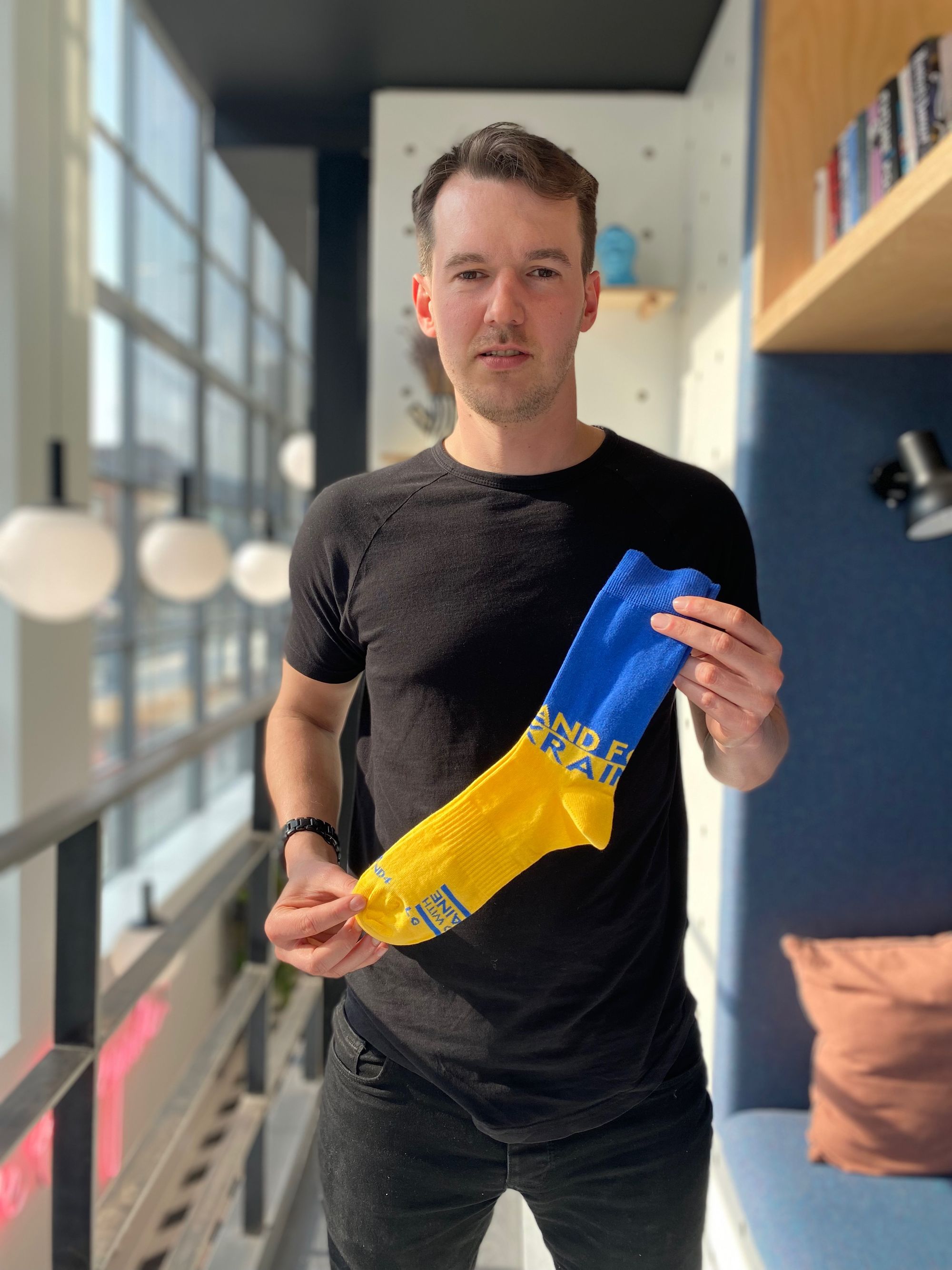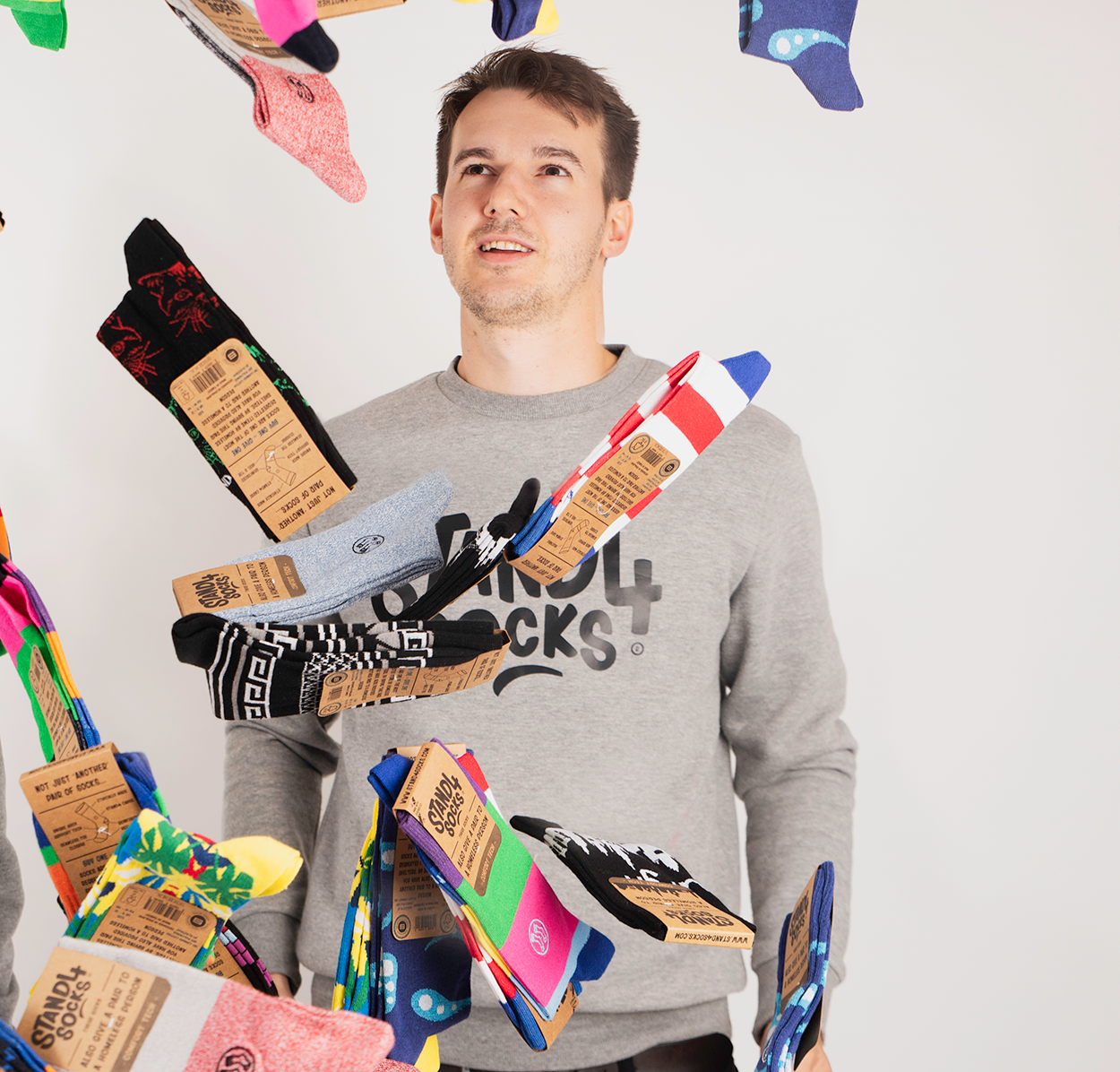New York, United States
Josh Turner has always had an entrepreneurial spirit. "From the age of six, I would gather up items from around the house, set up a little shop, and sell them back to my family!"
At school in Ipswich, England, he took things further. "When I was 12, I got into eBay, buying things like clothing and electronics from China to sell at school."
School, though, shut down Josh's venture, so he moved to selling online. "Friends were doing part-time jobs like washing dishes for £3 an hour, but I wanted to do things differently. It's part of being dyslexic. Although I was always bottom of the class, I excelled at creative things outside school."
Making a difference
That creativity led Josh, now 32, to set up his social enterprise business in 2015. Stand4 Socks runs on the buy one, give one model, and for each pair sold, a thick, specially engineered, antibacterial pair is given to a homeless person. So far, over 325,000 pairs have been given away. "Socks are the most requested item by homeless shelters because they are rarely donated," explains Josh.
The socks are distributed via charities, community groups, food banks, homeless shelters, women's refuges… "And I even hand out socks from my own backpack," smiles Josh.
The socks that customers buy online are different to those given away. They are bright, colorful and come in a vast range of designs — many depicting famous people, from Greta Thunberg to William Shakespeare.
As well as the buy one, give one model, Stand4 Socks teams up with causes to raise money and awareness. "For example, we collaborated with UK homeless charity Crisis," says Josh. "We designed a limited-edition sock, and they received a monetary donation from sales.
"Now we've become a certified B Corp — a business verified as balancing profit with people and the planet. It's been our ethos from day one."
It all began when Josh, recently graduated from university, joined an entrepreneur accelerator program. "I got into trouble for selling at school. Finally, I was being encouraged to be an entrepreneur!" he says. "At the end of the year, everyone had to pitch a business idea, and I was working on a Tinder-style app for corporate expenses. But I didn't really care about corporate finance, and I didn't really care about building an app — I just saw an opportunity."
Lightbulb moment
However, Josh then had a moment of inspiration. "I was in the pub, having a beer with friends, feeling fed up about my app idea, when — as I've always liked colorful socks — I suddenly said: 'Imagine if socks could change the world.'" And the seed of Stand4 Socks was planted.
Josh was living on welfare when he learned about a government scheme called the New Enterprise Allowance, which gave unemployed people a small amount of financial support to start a business. He submitted a plan for a sock business, got approved, and set up in his mum's garden shed.
"For a year, I did a lot of stuff that wasn't a priority — learning how to code, build a website, do graphic design… I didn't prioritize how to actually get the socks made. Everyone thought, 'Josh is running a sock company, but he doesn't have any socks.'"
"It's a cliché," he adds, "but when starting a business, you really need to just get out there and do it. I wrote multiple business plans, but as the boxer Mike Tyson said, 'Everyone has a plan until they get punched in the face.'"
"I've learnt from doing rather than planning. For example, when Stand4 Socks was finally launched, nothing was selling. So I did pop-up markets, drumming up customers and understanding what they wanted. That's what we've done ever since — adapting to the market, listening to feedback, constantly evolving."
But before the launch, of course, Josh did have to produce some socks. He approached factories in Britain and overseas. "I was young, and they'd assume I was a buyer for a brand like Top Man or Primark. I'd say I was from Stand4 Socks, and they'd say, Who?"
Making connections
Then the power of networking stepped in. "I attended many events, and one, organized by London's Chamber of Commerce, encouraged textile trade between the UK and Turkey." Four Turkish suppliers were there — including a sock factory. Josh was small-fry, though. Most sock orders are over 15,000 pairs per color; he only wanted 500. "Even so, they were happy to talk to me."
Afterwards, Josh made more fruitless factory visits. But then, after another unsuccessful trade fair in Istanbul, he reconnected with the Turkish sock manufacturer he'd met in London. "They worried that I'd do my first order, be unable to sell the socks, and go out of business with a big bank loan to pay off. But, taking a chance on me, they agreed to make just 3,000 pairs at cost."
Josh's socks are still made in that family-owned factory today. But now they're supplying 250,000 pairs per year. "We remain their smallest customer," smiles Josh, "but we have a great relationship. They're like mentors to me. The owners even came to my wedding last year."
Building good relationships is crucial for small-scale businesses, Josh believes. "We've been with the same factory since day one. We've worked with the same warehouse for years. You grow up believing that business means screwing people over and that you only do well if others do badly. But I've learnt that if we're a good customer, if we're honest and loyal, then people return the respect."

In April, Josh took his mum, Sally, around the factory — eight years after setting up Stand4 Socks in her shed. "The factory shows the scale of the business, as does the warehousing with whole lines of our socks everywhere. That first batch of 3,000 pairs came direct to me at home, and I packed orders from my bedroom."
Sally also met the factory team, including the head of operations, who calls herself Josh's Turkish mum. "It was great for them to meet!"
In one way, the business has gone full circle, as its registered address is back at Josh's mum's place. That's because he recently set up Stand4 Socks in the States and is currently based there. "We've started the US company and will launch the website in the autumn — Christmas is our busiest time."
As an online business, Stand4 Socks has always been global, with about 20% of customers in the US. "We're building on that and working on new designs specifically for the US market."
Proving Dragon’s Den wrong
In 2019, Josh appeared on Dragon's Den (the UK's version of Shark Tank), looking for a £60,000 investment in exchange for a 7.5% stake in his business. The dragons loved Josh and his ethos but didn't invest. And, he admits, it feels good that he's proved Stand4 Socks can thrive. "Even though the dragons were very positive about me, the fact that they didn't believe in my business hurt. Much of my identity is my business — I've even got a dog called Socks!"
Josh still hasn't brought in investors and owns 100% of Stand4 Socks. This, he feels, helped him survive in difficult economic times. "Last year was tough for all businesses, with the cost of living rising and inflation increasing. Sadly, a lot of entrepreneurial friends overstretched themselves and didn't make it through.
"We made mistakes too — we're holding too much stock and have a lot of cash tied up. But crucially, we didn't raise money from investments and overstretch ourselves using someone else's money."
Being the sole owner makes Josh careful with costs. "We always haggle, and I'm very hands-on with the figures now," he says. "Plus, I've got good mentors who challenge me if I want to take on new projects when we don't have the finance. That guidance keeps me grounded.
"Limited funds have made me resourceful, too," he adds. "I've learnt so many skills — such as taking product photographs and editing them myself rather than paying an agency."
Having done everything from customer service to designing socks means that, as the business grows and he hires people, Josh is able to train them himself. "We're a lean team, though, with five of us at the moment."
The importance of customer feedback
In terms of new designs for socks, selling online generates detailed information about what works and what doesn't. "We have lots of data about clicks on an item or search terms on our website, and we analyze data insight about searches in our market. Plus an annual customer survey helps us listen to what our biggest advocates — our customers — think and want."

Until recently, Josh designed all socks. This year there will be designs by Ukrainian artists. This is part of Josh's commitment to making a difference. When the war in Ukraine started in 2022, Stand4Socks leapt into action. "We immediately got 12,000 pairs of socks to the Polish border for refugees, and in January this year, we managed to get 18,000 pairs deep into Ukraine. We now have another 100,000 pairs to send. It's a logistical nightmare, but working with fantastic charity partners means we can send whole truck-loads to where they're needed most."
Josh funded this initiative via the buy one, give one model, producing a 'statement sock' in Ukrainian colors for people to buy. Another statement sock — Stand 4 Health Heroes — helped Josh fund socks for frontline workers during the pandemic. "Their PPE left a gap at the ankle, and hospitals urgently needed high-quality socks washable at high temperatures — so we supplied them," he explains.
Thinking outside the box
Yet another statement sock was created in partnership with the global charity Made by Dyslexia. "Each year, to show what a superpower dyslexia can be, Made By Dyslexia runs a conference gathering together famous dyslexics — from Sir Richard Branson to Dr. Bob Ballard, the man who discovered the wreck of the Titanic," says Josh. "We sponsored this year's event in New York, giving everyone a pair of Made by Dyslexia socks. I even briefly met Richard Branson!"
For Josh, dyslexia is a superpower. "I'd always seen it as a disability. I couldn't read, write or spell as well as other people. But I've realized my dyslexia is behind Stand4 Socks' success."



